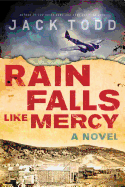
| Publisher: | Touchstone | |
| Genre: | General, Fiction, Sagas, Westerns | |
| ISBN: | 9781416598510 | |
| Pub Date: | November 2011 | |
| Price: | $25 |
| Mystery & Thriller |
by Jack Todd
Jack Todd returns to the Paint family, the central characters of his previous novels, Sun Going Done and Come Again No More, in a taut crime thriller with a dash of family saga set against the backdrop of World War II.
When a hired hand on the Paints' Wyoming ranch finds a girl's savaged corpse in an outbuilding, Sheriff Tom Call has only one clue to go on--the sadistic killer's shoe size. A distracting affair with Juanita, the beautiful, neglected younger wife of the Paint family patriarch, further hampers the investigation. Tom suspects a dangerous young man from a neighboring ranch, but after the bombing of Pearl Harbor, he abandons the case to join the Air Force. Meanwhile, the killer--caught and convicted for a lesser crime--sits out the war in prison until freedom allows one last psychotic spree that leads to a deadly showdown with Tom Call.
Readers unfamiliar with the earlier Paint family novels may be distracted by scenes featuring characters unessential to the immediate story, but Todd's flair for elaborating historical context gives Rain Falls Like Mercy drama and depth, just as his talent for sweeping natural scenes brings Wyoming's beauty and harsh weather to life. His rich prose captures the minutiae of each character's thoughts and emotions and renders murder scenes far more grisly than any gory description alone could. This tale of land, life and terror will please fans of both mainstream literature and the crime genre. --Jaclyn Fulwood, graduate assistant, University of Oklahoma Libraries
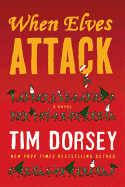
| Publisher: | Morrow | |
| Genre: | Humorous, Fiction | |
| ISBN: | 9780062092847 | |
| Pub Date: | October 2011 | |
| Price: | $16.99 |
| Mystery & Thriller |
by Tim Dorsey
"The most exciting holidays are the ones where not everybody is going to make it." Serge Storm's quirky bit of wisdom could never be more appropriate than it is in this festively themed installment of Tim Dorsey's hilarious series centered on a plucky, well-intentioned serial killer. It's time for Serge and his sidekick Coleman to haul out the holly along with the trash in Tampa, and the approaching holidays have Serge rethinking his life. He decides to try settling down, and what better place than across the street from his old pal Jim Davenport? While watching Jim closely to emulate what he believes to be the typical suburban lifestyle, Serge notices some rather unsavory characters taking a peculiar interest of their own in Jim's house and family, and decides to investigate. Armed with elf suits, a little know-how and a hefty dose of Christmas spirit, Serge and Coleman set out to take down any and all threats to the yuletide comfort and joy.
Dorsey's usual outlandish wit makes for a madcap caper on par with previous books in the series, though When Elves Attack is, perhaps, slightly less violent. The absurd menace of two skipping elves, the exploits of the tenacious retired ladies comprising the "G-Unit" and Jim's farce of a consulting job--he fires people, only to rehire them to fill the vacancies created by their absence--combine for an entertaining and appropriately ludicrous story sure to spread holiday cheer. --Sarah Borders, librarian, Houston Public Library
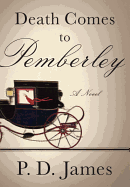
| Publisher: | Knopf | |
| Genre: | General, Fiction, Mystery & Detective, Historical | |
| ISBN: | 9780307959850 | |
| Pub Date: | December 2011 | |
| Price: | $25.95 |
| Mystery & Thriller |
by P.D. James
In Death Comes to Pemberley, the incomparable P.D. James has drawn a puzzling mystery around the characters from Jane Austen's Pride and Prejudice. Six years after her marriage to Fitzwilliam Darcy, Elizabeth has settled easily into her new life as the mistress of Pemberley. Her sister Jane has settled with Charles Bingley within a comfortable distance, as have Mary (yes, Mary, not Kitty) and her husband, the Reverend Theodore Hopkins. Just before Pemberley's annual autumn ball, a thundering coach screeches to a halt at the front doors. Out stumbles a hysterical Lydia. Her husband, George Wickham, lies dead somewhere in the estate's woodlands, and a disturbing murder investigation begins.
James draws heavily upon Austen's early 19th-century Pemberley and London for inspiration, but her signature mesmerizing style brings new life to the settings and the characters as the story progresses. She doesn't attempt to replicate the distinctive voice of Pride and Prejudice, but she does deliver authentic dialogue that carefully avoids anachronism. Of all the stories written based on the works of Jane Austen, Death Comes to Pemberley seems one of the most likely to win approval from the authoress herself. --Sarah Borders, librarian, Houston Public Library
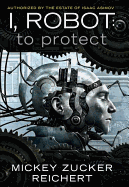
| Publisher: | Roc | |
| Genre: | General, Fiction, Science Fiction | |
| ISBN: | 9780451464194 | |
| Pub Date: | November 2011 | |
| Price: | $24.95 |
| Science Fiction & Fantasy |
by Mickey Zucker Reichert
I, Robot: To Protect tells the story of the early medical life of Dr. Susan Calvin, a frequent protagonist in the science-fiction short stories by Isaac Asimov that redefined the genre's concept of robotics. To Protect is the first in a planned trilogy (authorized by Asimov's estate) by fantasy novelist and pediatrician Mickey Zucker Reichert where, as in Asimov’s vision of the future, the Three Laws of Robotics--"A robot may not injure a human being," etc.--are beyond reproach as an ethical system, and humankind is invariably at fault, not science or robots. In fact, a profound level of optimism and faith in science is on display throughout To Protect.
The novel may be set in Asimov's universe, but Reichert applies her own vision to the material. As a first-year psychiatric resident, Susan Calvin is given the most hopeless pediatric cases. She's also involved in secret research involving nanorobots, bringing her closer to U.S. Robots and Mechanical Men, the secretive company her father has worked for all his adult life. Calvin's plotline eventually intersects with a broader story about terrorists out to destroy any thinking machines, especially those indistinguishable from humans, but Reichert gives equal weight to the details of Calvin's pediatric work and the robotic developments, and both aspects prove fascinating and ring equally true in the novel's near-future setting. --Rob LeFebvre, freelance writer and editor

| Publisher: | Sourcebooks Landmark | |
| Genre: | Fiction, Romance, Contemporary Women, Contemporary | |
| ISBN: | 9781402241451 | |
| Pub Date: | December 2011 | |
| Price: | $9.99 |
| Starred | Romance |
by Phillipa Ashley
Sending two prickly strangers on a vacation together may be a terrible idea in reality, but it's a delightful premise for a love story. Less than a day away from marrying Huw, her farmer-boy fiancé, Carrie finds herself unceremoniously jilted. Adding insult to injury, she learns he's marrying someone else. In need of a diversion, she plans a tour of the Continent with her best friend, who then gets a last-minute job offer. Desperate to stop Carrie's moping, she taps Dr. Matt Landor, who is idling in the U.K. on forced R&R from his do-gooding work in the tropics, to go in her stead.
Full-on rom-com insanity can wear thin fast and alienate the reader, but Phillipa Ashley (wish You Were Here) strikes just the right tone, and then maintains it through the shenanigans that follow. Carrie is by turns heartbroken and furious, but remains fundamentally likable and relatable. Crashing Huw's wedding, she restrains herself from disrupting the ceremony (but does demolish a flashy flower arrangement). The good doctor, for his part, is hunky without being a stereotypical Prince Charming. For example, when rescuing Carrie from where she's been abandoned on a beach, stoned out of her mind, he doesn't panic, and just laughs. The bickering-but-attracted plot is nothing new, but it's enjoyably executed. Anglophile readers will also enjoy across-the-pond references to rugby fandom and jokes about David Tennant's hotness. --Kelly Faircloth, freelance writer
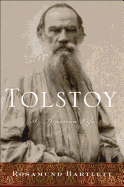
| Publisher: | Houghton Mifflin Harcourt | |
| Genre: | Biography & Autobiography, Literary | |
| ISBN: | 9780151014385 | |
| Pub Date: | November 2011 | |
| Price: | $35 |
| Biography & Memoir |
by Rosamund Bartlett
In her introduction to Tolstoy: A Russian Life, Rosamund Bartlett writes that "the greatest task facing the biographer of Tolstoy is the challenge of making sense of a man who was truly larger than life." Bartlett is no stranger to the sort of meticulous research required of a biographer who chooses to delve into such a vast project: an authority on Russian cultural history, she has already written an acclaimed biography of Anton Chekhov and translated much of his writing. Yet Tolstoy is more than a well-researched synopsis of a great writer's life and works. As the subtitle suggests, Bartlett has written a superb history of one of Russia's most famous and influential men of all time.
As might be expected in a Tolstoy biography, Bartlett's book is lengthy, with nearly 100 pages just for notes and bibliography. For all its size, though, it is rarely slow or weighed down by its scholarship. Bartlett is careful to include details about Tolstoy's family, friends and surroundings as they influenced his maturation, both as a man and as a writer. She is honest in discussing Tolstoy's flaws and equally compelling as she examines the spiritual and intellectual journey that ultimately culminated in his rejection of both personal possessions and relationships at the end of his life. A final chapter exploring Tolstoy's global impact, even after his death, provides an unexpected and satisfying ending to this engaging biography. --Roni K. Devlin, owner of Literary Life Bookstore & More

| Publisher: | Atria | |
| Genre: | Pets, Biography & Autobiography, Dogs, Military, Breeds - Working & Herding Dogs, Personal Memoirs | |
| ISBN: | 9781451635966 | |
| Pub Date: | December 2011 | |
| Price: | $26 |
| Biography & Memoir |
by Mike Dowling
Rex may not have Rin Tin Tin's star power, and Mike Dowling won't jeopardize Tim O'Brien's literary accolades, but between them they give readers a first-rate buddy story from the front lines of the Iraq war.
Joining the Marine Corps at 22, Dowling quickly aspired to qualify as a military working dog handler. He and Rex tenaciously trained to become one of the first K9 teams deployed to Iraq. Their job was to be the first to enter a road or town, searching for deadly bombs before the rest of the troops moved in, and he shares their suspenseful searches for explosives and bomb-making supplies hidden near Mahmoudiyah, their 24/7 togetherness and stories of Rex's loyalty and skills. Mike anthropomorphizes Rex, and their "conversations" become credible. "Seek seek seek," Mike whispers; Rex freezes momentarily: "Wait a second; I think I got something!"
Sergeant Rex's first-person accounts of deployment--the heat and dust of the Triangle of Death south of Baghdad (Rex required gallons of water for each mission, to drink and to be poured over his heavy fur), the vigilance against insurgents and the alternate boredom and action of a war zone--read like a letter home. Dowling writes to honor his canine partner and his comrades, and offers a quick-paced, realistic and poignant glimpse of the lives of a U.S. Marine and his dog (and an epilogue providing details of their post-deployment years reassures readers that they made it home safe). --Cheryl Krocker McKeon, bookseller

| Publisher: | AmazonEncore | |
| Genre: | Travel, Special Interest, Gay & Lesbian, General, Humor, Biography & Autobiography, Educators, Personal Memoirs | |
| ISBN: | 9781612181318 | |
| Pub Date: | November 2011 | |
| Price: | $14.95 |
| Travel Literature |
by Tim Anderson
"Why would a college graduate with such impeccable credentials such as a BA in English, diabetes, credit card debt, and a fierce and unstoppable homosexuality leave the boundless opportunities available to him in the USA (temping, waiting tables, getting shot at by high school students) for a tiny, overcrowded island heaving with clever, sensibly proportioned people who make him look fat?"
The travel genre is bloated with books clamoring to answer variations on that question, and they usually have to do with romance, redemption and the quest for personal growth through encounters with another culture. Tune in Tokyo: The Gaijin Diaries, Tim Anderson's account of the two years he taught English in Japan, stands out among such stories because his stint abroad has very little to do with personal growth--focusing instead on funny stories about classroom mishaps, bad roommates and chemically enhanced adventures in Tokyo nightclubs. If you're looking for insight into Japanese culture, this is likely not the book for you.
But it's so much fun. Anderson refuses to take himself too seriously, and he's unafraid to let his status as a gaijin (outsider) who "doesn't speak a lick of Japanese" get in the way of seeking out experiences that make great stories, like joining an all-Japanese rock band on the viola. He also puts his wit to work in commentary on Japanese pop culture (like the national obsession with characters from "the Hello Kitty School of Aggressive Cuteness"), gay manga comics and the mysteriously ubiquitous pairing of dorky white guys and super-hot Japanese women. Anderson moved to Tokyo to have a good time. His Gaijin Diaries are your invitation to the party. --Hannah Calkins, blogger at Unpunished Vice
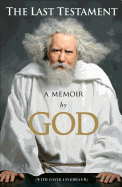
| Publisher: | Simon & Schuster | |
| Genre: | Humor, Religion, Topic | |
| ISBN: | 9781451640182 | |
| Pub Date: | November 2011 | |
| Price: | $23.99 |
| Humor |
by God with David Javerbaum
Absurdity reigns in The Last Testament, a wickedly funny tell-all written from God's point of view as channeled via David Javerbaum (former head writer for The Daily Show with Jon Stewart). The book resembles a Holy Bible in language, text layout, font style and structure, its seven sections rendered like scripture, complete with numbered chapters and verses--a wise choice as the sentence spacing allows the reader to stop laughing long enough to come up for air.
God offers His hilarious 21st-century take on topics such as sports, celebrities, prayer, natural disasters, homosexuality, abortion, social media, sex, love and marriage. New Gospels shed light on His unmitigated feelings about Jews, Christians, Jesus, Mohammed, Islam--and everything in between. There is also a graphics section (a photograph of the Holy Grail is credited as "courtesy of the Mel Gibson Collection"), a chapter devoted to "Godlibs" (a fill-in-the-blank word game) and some of God's favorite things, including a cocktail called a "72 Virgins Colada."
The smartly funny pseudo-memoir culminates in "Revelation," an in-depth accounting of the signs foretelling the apocalypse scheduled for 2012: the "Brangelina" family will finally separate, gas will go up to $6.66 per gallon, the SATs will introduce a fourth section on tweeting, and "I Can't Believe It's Not Butter" will admit it was butter all along. In the end, no religion, believer or nonbeliever is spared as "King of the Universe" unleashes His zany wrath. --Kathleen Gerard, blogger at Reading Between the Lines
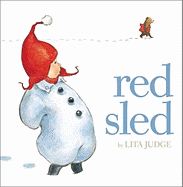
| Publisher: | Atheneum | |
| Genre: | Animals, General, Imagination & Play, Juvenile Fiction, Humorous Stories | |
| ISBN: | 9781442420076 | |
| Pub Date: | November 2011 | |
| Price: | $16.99 |
| Children's & Young Adult |
by Lita Judge
If the goal in The Mitten is to fit as many creatures as possible inside, the mission of Red Sled is to pile as many creatures as possible on top!
The sounds of crunching snow ("scrinch scrunch scrinch scrunch...."), the utterance of discovery ("Hrmmm?") and the screams of a thrill ride ("Rooooeeeeoeoee") provide the sole accompaniment to Lita Judge's (One Thousand Tracings) story told in pictures. A red sled leans against a snow-covered cabin with a light in the window and a wisp of smoke from the chimney. A bear finds the sled ("Hrmmm?") and tucks it under its paw. A rabbit peeks at the bear from the bottom of the page, and in the next illustration, bear and rabbit glide downhill in a thrill ride. Other animal onlookers join in, and Judge plays with size and color contrast to heighten the comedy. At one point, a moose balances the bear on its antlers while protecting the rabbit between its hoofed legs, and the larger animals' brown fur pops against the full moon. In another funny scene, a porcupine grabs two points on the moose's antlers, and its quills give the appearance of a person's hair standing on end. Bear and rabbit kindly return the red sled to its rightful owner (a red-capped child who, up to now, has been glimpsed only on the opening pages). A closing shot shows that not only is it nice to share, it's also a whole lot more fun. Like the red sled's riders, young readers will be pleading, "Again!" --Jennifer M. Brown, children's editor, Shelf Awareness

| Publisher: | Cameron & Company | |
| Genre: | Aviation, Transportation, Imagination & Play, Juvenile Fiction | |
| ISBN: | 9780918684882 | |
| Pub Date: | November 2011 | |
| Price: | $12.95 |
| Children's & Young Adult |
by Robert Cameron and Nina Gruener, photos by Robert Cameron
Robert Cameron (1911-2009) was a passionate photographer known for his gymnastic contortions out of helicopters to get the best panoramic shots of American cities. Here his granddaughter Nina Gruener offers clever captions aimed at young readers to accompany her grandfather's magnificent views of the five boroughs.
"They've been down in the subway, and seen buildings so tall/ Cam's having a blast, but he feels rather small" accompanies an aerial view from the southern end of Manhattan (you can see how Washington Square Park anchors Fifth Avenue) looking north to a patch of green that we can make out as Central Park. While Cameron's photos capture New York City at different times of day and in its many moods, Gruener's text retains a child's-eye view of the Museum of Natural History (which "looks lovely and old/ A castle-like dollhouse where mysteries unfold"), the Brooklyn Bridge ("its cables look like spider webs") and Wall Street ("No bulls or bears that he can see from up here/ Silly grown ups, there's nothing to fear"), among other highlights. Toward the end, the narrator becomes more reflective as he "wonders how it must have been/ to be a kid on Ellis Island, waiting for a new life to begin."
This smartly designed board book with thick matte corrugated pages is made for repeated readings. It's a great introduction to New York that doubles as a travel guide for children who are Big Apple–bound or armchair travelers. See also last year's Above San Francisco. --Jennifer M. Brown, children's editor, Shelf Awareness
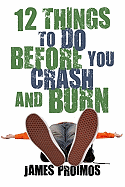
| Publisher: | Roaring Brook | |
| Genre: | General, Social Issues, Family, Juvenile Fiction | |
| ISBN: | 9781596435957 | |
| Pub Date: | November 2011 | |
| Price: | $14.99 |
| Children's & Young Adult |
by James Proimos
Perhaps because of all of his experience with picture books, James Proimos (Todd's TV) uses just 122 pages to pen a funny, poignant YA novel that takes place over two weeks.
Readers will know they're in for a treat when 16-year-old James "Hercules" Martino breaks the saintly spell at his father's funeral by calling the man as he saw him: "a complete and total ass." It does not help that his father was a bestselling self-help author. Hercules pretends to be upset when his mother sends him to his father's brother, Uncle Anthony, for the last two weeks of summer, but we quickly discover how well they get along--especially when his uncle gives Hercules the list of the "12 Things" referenced in the book's title. It's a mix of the sublime ("choose a mission") and the ridiculous ("clean out the garage"), but it accomplishes the goals of both uncle and nephew. Herc's goal, of course, is to find the "Strange Beautiful Unattainable Woman" he sat next to and who would not speak with him on the train from New York to Baltimore.
Even at his most macho, Herc shows a vulnerable side. In addition to his father's death, the novel probes some mature themes (e.g., in what we'll call the "mission accomplished" scene), but Proimos handles them with humor and a respect for his audience. --Jennifer M. Brown, children's editor, Shelf Awareness